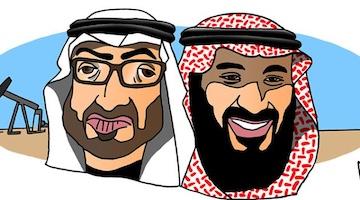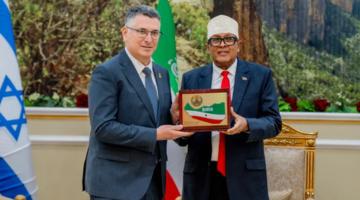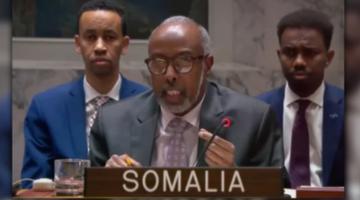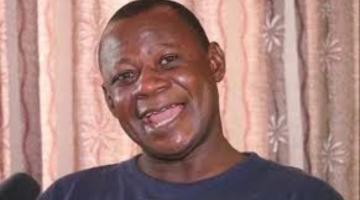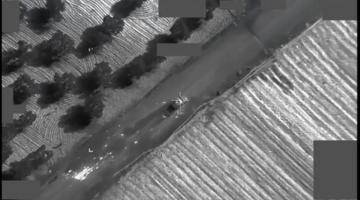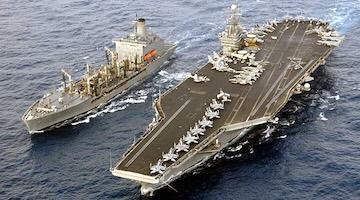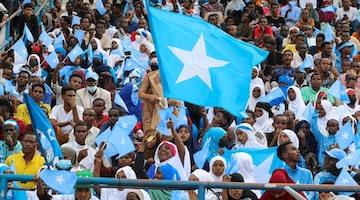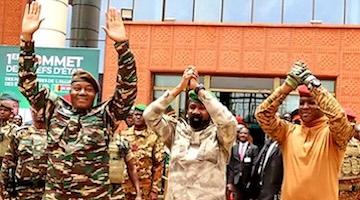This is a condensed speech by Salome Ayuak given at the International Month of Action Against AFRICOM launch event - "AFRICOM at 13: Building the popular movement towards demilitarization and anti-imperialism in Africa."
Horn of Africa Pan Africans for Liberation and Solidary (HOA PALS) understands the Horn as Ethiopia, Sudan, Kenya, South Sudan, Djibouti, Uganda, Somalia, and Eritrea. Of these eight countries, only Eritrea does not have a relationship with U.S. Africa Command (AFRICOM), subjecting it to continuous threats, sanctions, and other forms of imperial stronghold.
Between the seven remaining countries, AFRICOM has approximately eleven bases in the Horn, meaning that over 1/3rd of the permanent and semi-permanent AFRICOM bases are in the horn of Africa region. Divided by country, there are three bases in Kenya, two in Djibouti, one in Uganda, and five in Somalia. Each of these bases plays varying roles, such as the Somalia and Djibouti bases supporting the U.S and other western powers in gaining access to the Gulf of Aden, the Indian Ocean, and other water pathways to extract, appropriate, and export oil for their corporate interests.
In this way, we must understand the fight against AFRICOM as not only a land battle, but also a battle of waterways - a war arena often left out of conversations on militarism and imperialism. It is through these waterways that these exploits are moved to the west. One of the main exercises leading the ocean exploits is Cutlass express - a U.S NAVAL forces domain exercise in “East African” coastal regions and the West Indian Ocean. Horn of Africa countries participating in this include Kenya, Somalia, Sudan, and Djibouti. While AFRICOM claims that it is in the region for the security and protection of African peoples, we know that its true interest is centered on capitalist exploitation. The positioning and timing of AFRICOM bases align with what resources exist.
For example, in 2009, a large discovery of about 1.7billion barrels of oil was made at the Congo and Uganda border. Soon after, the area became heavily militarized, and Uganda was made a key partner for multinational oil conglomerates. By 2012, the Black-ish president Barack Obama conveniently announced he would be deploying US troops on the ground in Uganda, presumably to capture Joseph Kony, the leader of a small rebel group. The timing of this is critical to our understanding of the true interests of these western leaders - even the Black and so-called African ones. First, by 2012, Joseph Kony had been out of Uganda for almost 6 years. In fact, many of us, especially South Sudanese refugees who were impacted in Northern Uganda, had sought asylum elsewhere or went back to South Sudan. Second, the timing of AFRICOM’s deployment came at the same exact time as accusations that some high ranked officials in the Ugandan government were guilty of accepting bribes from international oil companies, creating a clear pathway for U.S military personnel.
Most have probably heard of “Kony 2012,” the film that led to wide public support for an American military expansion in Africa to “save the children.” Obama’s same administration, who rationalized saving the children as a premise for further militarization in Uganda, also signed multiple waivers to bypass congressional ruling that bars the U.S from providing military weapons to countries where child soldiers are trained - such as in South Sudan.
It’s critical for us to be vigilant when certain cries are made around single “enemies,” when the deaths of AfricanBlack people, particularly children, are utilized as weapons to further exploit our people. The deployment of these forces in Uganda had less to do with Kony, and all to do with securing US oil interests. Imperialists manipulate crises in order to advance their own national interests. AFRICOM is not in the Horn of Africa for regional security, stability, and prosperity. The materialist impacts speak for themselves.
HOA PALS and Anti-Imperialism
HOA PALS understands present day policing in Africa whether by AFRICOM, the French, Britain, etc., cannot be divorced from the foundations of these very nation states. Though our focus is on the eight Horn of Africa countries, we understand that many of these states were carved up and divided by European colonizers, and we argue that our liberation can only come from uniting our communities on the basis of Pan Africanist movement building.
We are building an organization that seeks to educate the diaspora, challenge us to learn and unlearn, and increase consciousness, so that we become better comrades for liberation struggles everywhere. Primarily, we focus on the foundations of political education, building mutual aid networks, and collaborating with like-minded organizations from the diaspora.
HOA PALS recognizes that it is our responsibility, those in the diaspora, to understand the methodologies of the empire so that we can easily recognize them when they are deployed. Through a materialist lens, we understand AFRICOM as part of a long history of policing in African states. Many of the nation-states in the region are still playing their colonially assigned roles. That is because “flag independence” actually meant the sharpening of imperialist grips, as opposed to true liberation.
For example, through AFRICOM Uganda still maintains its role as the policing arm for imperialists in the Horn, military intensifying conflicts in South Sudan, Congo, and even Somalia.
We must see Western militarism and policing for what it is - a way to control movement and crush rebellion in the interests of capital. That is the case for Somalia, Ethiopia, Uganda, Kenya, and all African countries.
Two ways we have worked to make these realities clear have been through the #ShutdownAFRICOMSomalia Campaign and a detailed report on Tigray.
Earlier this spring, HOA PALS launched the #ShutDownAFRICOMSomalia campaign in order to raise the public's consciousness and build towards an end to the U.S Shadow War in Somalia.
As mentioned earlier, the horn has eleven AFRICOM bases. Five of those are in Somalia. About 14 years ago, prior to the official establishment of AFRICOM, George Bush began an undeclared war on Somalia as part of the “War on Terror.” Under the Horn’s own Barack Obama, drone strikes intensified and escalated through AFRICOM. All of this has resulted in 249 declared U.S military actions on Somalia since 2007, leading to the murder of thousands and the displacement of hundreds of thousands of people.
Right now, though some U.S troops have relocated to other parts of the Horn, there’s still aggressive action on Somalia - including under the first Black-ish woman vice president, Kamala Harris. The war on Somalia is also made possible by the complicity of neighboring African nations with western military forces.
HOA PALS understands that the purpose of this war on Somalia is rooted in capitalist exploitation. Somalia's coastline is on the Indian Ocean and is an access point to the Arabian Peninsula and Gulf of Aden. That is why whether it's Somalia, Uganda, or Tigray, we must be vehemently anti-imperialist and materialist in our understandings of conflicts. Otherwise, we may fall for the pitfalls of neoliberalism and support imperialism.
This is why we make it a point to create clear positions and historical backgrounds on matters impacting AfricanBlack people in the Horn. Our detailed report on the Tigray War was an example of working to provide clarity from a Pan-Africanist anti-imperialist lens. The report concludes:
As anti-imperialists, we vehemently oppose any and all United States, United Kingdom and European Union-led interventionist politics in the region working to further Western hegemonic geopolitical interests. Further, we decry all forces weaponizing misinformation, disinformation, and sensationalism, by way of falsifying facts, images, videos, and figures, particularly by Western media and rights organizations, sowing discord, tension, and hostilities amongst all parties to the conflict.
We implore all to consider the ongoing conflicts in Ethiopia and Eritrea as they are driven and fortified by the functions of neo-colonialism, imperialism, and its proxy actors, that are fueling the growing material contradictions in the region.
Finally, we support African-owned, localized conflict resolution - not tied to advancing imperialism, neo-colonialism, and other nefarious Western agendas - as we believe in the inherent agency and ability of Africans on the continent to reach a resolution to the conflict peacefully and independent of Western aggression, destabilization, and extractive and exploitative economic interests.
The Tigray report and the #ShutdownAFRICOM Somalia campaign speaks to key parts of our vision for building a popular movement to demilitarize Africa.
In order for AfricanBlack people in one part of the Horn to be free, we need the entire region and, frankly, all African peoples to be united. As Pan Africanists, HOA PALS understands that we have a responsibility to each other as AfricanBlack people. As such, we have a responsibility to learn, understand, and disentangle the contradictions that keep us falling for the same imperialist games. We have a responsibility to fight for liberation wherever we are situated in this world. We have a responsibility to build a popular movement to demilitarize Africa. While how the fight looks in each given context should be determined by those people, we recognize that it must be rooted in anti-imperialisms.
Salome Ayuak is a Coordinating Committee member of the Black Alliance for Peace, Co-Chair of the Decolonial Feminist Collective, and member of the Horn of Africa Pan-Africans for Liberation and Solidary. Through each of these spaces, she works collaboratively to deepen political education central to the liberation praxis of AfricanBlack people.

